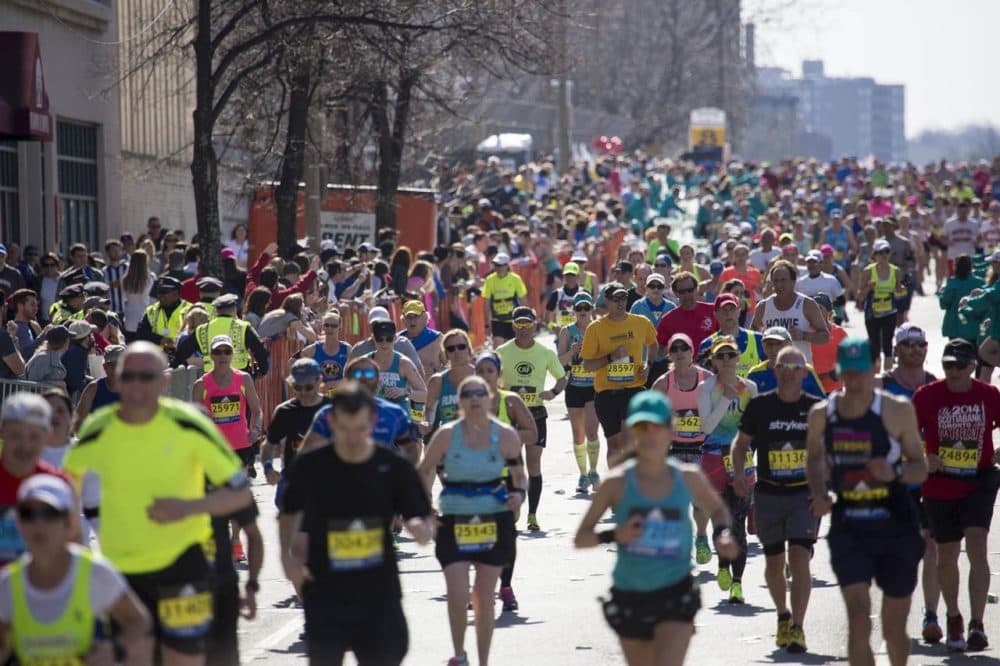Advertisement
How Much Do Aging Runners Really Slow Down? Maybe Less Than You Think
Resume
Alice Rushforth didn't start taking running more seriously until her 50s, as she found that she was fast enough to earn top-three finishes in 5K road races for her age group. Now, at 57, she's not ready to slow down just yet.
In fact, she thinks there's still time to go faster in the future.
"I'm finding I'm working hard to beat those times from last year or five years ago," says Rushforth, who runs with the Boston Bulldogs Running Club. "And I can say, 'Here I am, I'm three, four years older and I'm actually doing that 5K faster.' "
Recent research offers more hope for runners like Rushforth who want to stay fast later in life.
The study, in The Review of Economics and Statistics, compares world record times of runners ages 40 to 95 to estimate how much people slow down with age in races like the marathon and 5K.
The data show older runners only decline gradually after age 40, before finally slowing down more dramatically in their late 70s. The study models also predict that people slow down at about the same rate — about 1 percent added to their times each year — whether or not they're elite runners.
The data show older runners only decline gradually after age 40, before finally slowing down more dramatically in their late 70s.
One of the study's authors, Ray Fair, is himself an avid runner in his mid-70s. He took an interest in studying decline rates of runners to see if he was slowing down at the right pace with age. He also has a website where runners can input their best times for given races to see what their times should be as they get older.
His co-author on the study, Ed Kaplan, a professor of engineering and public health at Yale University, says if you imagine both elite and average athletes running in a race together, you can picture how this data relates to everyone regardless of skill.
"The people at the leading edge of it, those are the world record holders," he explains. "The people who are further back in the pack are further back in the pack. But nonetheless, this idea that they're going down a couple of percentage points a year is something that actually seems to hold."
How Fast Can A 70-Year-Old Run?
With runners like 70-year-old Jeannie Rice of Cleveland setting marathon world records for her age group, the study authors also wanted to answer another question: How fast can a 70-year-old marathoner possibly run?
The study compares the age-related decline curve of today's fastest runners with that of the fastest humanly possible times predicted for each age and distance race. These projections suggest that these fastest-possible times may get even faster in the future, as more people run into their 60s and beyond while improving their training practices and nutrition.
"We estimate that you could knock off about 7.5 percent of the existing time,” Kaplan says. "So, for example, with the marathon, that says that we believe it will be humanly possible to cut maybe about 9 or nine-and-a-half minutes off the marathon."
Rice’s time of 3:27:50 in October's Chicago Marathon smashed the previous world record for the 70-year-old women’s group by almost 8 minutes. Fair and Kaplan’s data suggest that Rice’s mark, and those of other age groups, could fall by at least that much again.
The models in the study assume runners stay in shape and avoid major injuries that might slow them down more than expected. They tend to focus mainly on men, however; there's not much data on women runners and how they slow down with age.
Boston runner Rushforth, who is the executive director of the Tufts Clinical and Translational Sciences Institute, says having more information on women runners would motivate her to keep improving.
"All the information that's online now, and all these kinds of studies are important," she says. "[It's] not the kind of thing I tapped into for motivation in my youth, but now I do look up my times compared to other women my age, and use that as a little bit of an incentive."
Future research will focus on gathering more data on 80- and 90-year-old runners; runners at those ages are less common, the recent study notes.
Whether you're a dedicated athlete or just looking to exercise more, Dr. Aaron Baggish has good news if you're looking to run as you get older. Baggish, director of the Cardiovascular Performance Program at Massachusetts General Hospital, says that no matter how old you are, training can be beneficial.
"The human body stays trainable for a much longer period of time than most people think," he says. "Older athletes can run pretty fast and, importantly, respond to training and get faster."
If you are hoping to start a running program as a 70-year-old, though, Mike Ferullo of Boston has some advice for you: Know your limits.
Ferullo started running 40 years ago to overcome addiction. These days, as the president of the Boston Bulldogs Running Club, he's helping other people who have been affected by addiction push themselves into their later years.
Now 70, he hopes to run until he's 80. But that's still no easy task.
"If you want to survive and keep running, you have to first accept that you're not 35, 40 anymore," Ferullo says. "Your mind might want to run like that, but your running regimen has to be different."
Fortunately, the study may reassure some aging runners that the future is not so bleak: "Even at age 90," it notes, "people are only a little more than twice as slow as they were in their peak years. Assuming that one is not injured or sick, stays in peak shape age-corrected, and declines in percentage terms at the same rate as the world records, life is good."
This segment aired on December 19, 2018.
